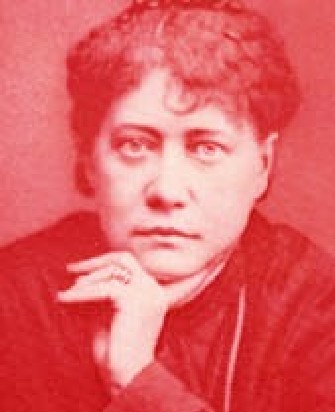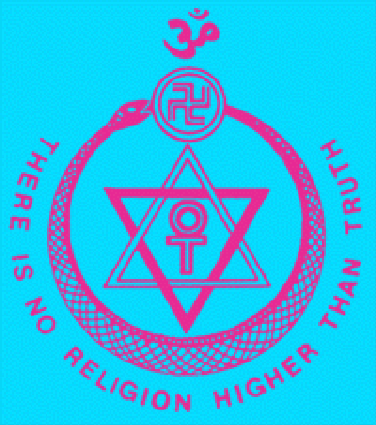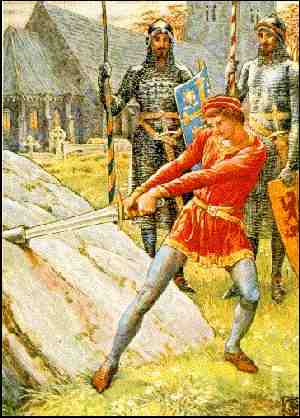Writings
of H P Blavatsky
Theosophy
House
206
Newport Road, Cardiff, Wales, UK. CF24 -1DL

Helena Petrovna Blavatsky (1831 – 1891)
The Founder of Modern Theosophy
Is The Desire
To Live Selfish?
By
H
P Blavatsky
THE passage,
"to Live, to Live, TO LIVE must be the unswerving resolve," occurring
in the article on the Elixir of Life, published in the March and April Numbers
of Vol. III of the Theosophist, is often quoted, by superficial readers
unsympathetic with the Theosophical Society, as an argument that the above
teaching, of occultism is the most concentrated form of selfishness. In order
to determine whether the critics are right or wrong, the meaning of the word
"selfishness" must first be ascertained.
According to an
established authority, selfishness is that "exclusive regard to one's own
interest or happiness; that supreme self-love or self-preference which leads a
person to direct his purposes to the advancement of his own interest, power, or
happiness, without regarding those of others."
In short, an absolutely
selfish individual is one who cares for himself and none else, or, in other
words, one who is so strongly imbued with a sense of importance of his own
personality that to him it is the acme of all his thoughts, desires and
aspirations and beyond that all is a perfect blank. Now, can an occultist be
then said to be "selfish" when he desires to live in the sense in
which that word is used by the writer of the article on the Elixir of Life? It
has been said over and over again that the ultimate end of every aspirant after
occult knowledge is Nirvana or Mukti, when the individual, freed from all
Mayavic Upadhi, becomes one with Paramatma, or the Son identifies himself with
the Father in Christian phraseology. For that purpose, every veil of illusion which
creates a sense of personal isolation, a feeling of separateness from THE ALL,
must be torn asunder, or, in other words, the aspirant must gradually discard
all sense of selfishness with which we are all more or less affected. A study
of the Law of Cosmic Evolution teaches us that the higher the evolution, the
more does it tend towards Unity. In fact, Unity is the ultimate possibility of
Nature, and those who through vanity and selfishness go against her purposes,
cannot but incur the punishment of total annihilation. The Occultist thus
recognises that unselfishness and a feeling of universal philanthropy are the
inherent law of our being, and all he does is to attempt to destroy the chains
of selfishness forged upon us by Maya. The struggle then between Good and Evil,
God and Satan, Suras and Asuras, Devas and Daityas, which is mentioned in the
sacred books of all the nations and races, symbolizes the battle between
unselfishness and the selfish impulses, which takes place in a man, who tries
to follow the higher purposes of Nature, until the lower animal tendencies,
created by selfishness, are completely conquered, and the enemy thoroughly
routed and annihilated. It has also been often put forth in various
theosophical and other occult writings that the only difference between an
ordinary man who works along with Nature during the course of cosmic evolution
and an occultist, is that the latter, by his superior knowledge, adopts such
methods of training and discipline as will hurry on that process of evolution,
and he thus reaches in a comparatively very short time that apex to ascend to
which the ordinary individual may take perhaps billions of years. In short, in
a few thousand years he approaches that form of evolution which ordinary
humanity will attain to perhaps in the sixth or the seventh round during the
process of Manvantara, i.e., cyclic progression. It is evident that the average
man cannot become a MAHATMA in one life, or rather in one incarnation. Now
those, who have studied the occult teachings concerning Devachan and our
after-states, will remember that between two incarnations there is a
considerable period of subjective existence. The greater the number of such
Devachanic periods, the greater is the number of years over which this evolution
is extended. The chief aim of the occultist is therefore to so control himself
as to be able to control his future states, and thereby gradually shorten the
duration of his Devachanic states between his two incarnations. In his
progress, there comes a time when, between one physical death and his next
re-birth, there is no Devachan but a kind of spiritual sleep, the shock of
death, having, so to say, stunned him into a state of unconsciousness from
which he gradually recovers to find himself reborn, to continue his purpose.
The period of this sleep may vary from twenty-five to two hundred years,
depending upon the degree of his advancement. But even this period may be said
to be a waste of time, and hence all his exertions are directed to shorten its
duration so as to gradually come to a point when the passage from one state of
existence into another is almost imperceptible. This is his last incarnation,
as it were, for the shock of death no more stuns him. This is the idea the
writer of the article on the Elixir of Life means to convey, when he says:--
By or about the
time when the Death-limit of his race is passed HE IS ACTUALLY DEAD, in the
ordinary sense, that is to say, that he has relieved himself of all or nearly
all such material particles as would have necessitated in disruption the agony
of dying. He has been dying gradually the whole period of his Initiation. The
catastrophe cannot happen twice over. He has only spread over a number of years
the mild process of dissolution which others endure from a brief moment to a
few hours. The highest Adept is in fact dead to, and absolutely unconscious of,
the World--he is oblivious of its pleasures, careless of its miseries--in so
far as sentimentalism goes, for the stern sense of DUTY never leaves him blind
to its very existence. . . .
The process of
the emission and attraction of atoms, which the occultist controls, has been
discussed at length in that article and in other writings. It is by these means
that he gets rid gradually of all the old gross particles of his body,
substituting for them finer and more ethereal ones, till at last the former
sthula sarira is completely dead and disintegrated and he lives in a body
entirely of his own creation, suited to his work. That body is essential for
his purposes, for, as the Elixir of Life says:--
But to do good,
as in every thing else, a man must have time and materials to work with, and
this is a necessary means to the acquirement of powers by which infinitely more
good can be done than without them. When these are once mastered, the
opportunities to use them will arrive. . . .
In another
place, in giving the practical instructions for that purpose, the same article
says:
The physical
man must be rendered more ethereal and sensitive; the mental man more penetrating
and profound; the moral man more self-denying and philosophical.
The above
important considerations are lost sight of by those who snatch away from the
context the following passage in the same article:--
And from this
account too, it will be perceptible how foolish it is for people to ask the
Theosophists "to procure for them communication with the highest
Adepts." It is with the utmost difficulty that one or two can be induced,
even by the throes of a world, to injure their own progress by meddling with
mundane affairs. The ordinary reader will say--"This is not God-1ike. This
is the acme of selfishness" . . . . But let him realise that a very high
Adept, undertaking to reform the world, would necessarily have to once more
submit to Incarnation. And is the result of all that have gone before in that
line sufficiently encouraging to prompt a renewal of the attempt?
Now, in
condemning the above passage as inculcating selfishness, superficial readers
and thinkers lose sight of various important considerations. In the first
place, they forget the other extracts already quoted which impose self-denial
as a necessary condition of success, and which say that, with progress, new
senses and new powers are acquired with which infinitely more good can be done
than without them. The more spiritual the Adept becomes, the less can he meddle
with mundane, gross affairs and the more he has to confine himself to a
spiritual work. It has been repeated, time out of number, that the work on a
spiritual plane is as superior to the work on an intellectual plane as the one
on the latter plane is superior to that on a physical plane. The very high
Adepts, therefore, do help humanity, but only spiritually: they are
constitutionally incapable of meddling with worldly affairs. But this applies
only to very high Adepts. There are various degrees of Adeptship, and those of
each degree work for humanity on the planes to which they may have risen. It is
only the chelas that can live in the world, until they rise to a certain
degree. And it is because the Adepts do care for the world that they make their
chelas live in and work for it, as many of those who study the subject are
aware. Each cycle produces its own occultists who will be able to work for the
humanity of those times on all the different planes; but when the Adepts
foresee that at a particular period the then humanity will be incapable of
producing occultists for work on particular planes, for such occasions they do
provide by either giving up voluntarily their further progress and waiting in
those particular degrees until humanity reaches that period, or by refusing to
enter into Nirvana and submitting to re-incarnation in time to reach those
degrees when humanity will require their assistance at that stage. And although
the world may not be aware of the fact, yet there are even now certain Adepts
who have preferred to remain statu quo and refuse to take the higher degrees,
for the benefit of the future generations of humanity. In short, as the Adepts
work harmoniously, since unity is the fundamental law of their being, they have
as it were made a division of labour, according to which each works on the
plane at the time allotted to him, for the spiritual elevation of us all--and
the process of longevity mentioned in the Elixir of Life is only the means to
the end which, far from being selfish, is the most unselfish purpose for which
a human being can labour.
Theosophist,
July, 1884
______________________

Cardiff
Theosophical Society in
Theosophy
House
206
Newport Road, Cardiff, Wales, UK. CF24 -1DL
Find out
more about
Theosophy
with these links

The Cardiff Theosophical Society Website
The National Wales Theosophy Website
If you
run a Theosophy Group, please feel free
to use
any of the material on this site
The Most Basic Theosophy
Website in the Universe
A quick overview of Theosophy
and the Theosophical Society
If you run a Theosophy Group you
can use this as an introductory handout.
Theosophy Cardiff’s Instant Guide
One liners and quick explanations
H P Blavatsky is
usually the only
Theosophist that most
people have ever
heard of. Let’s
put that right
The Voice of the Silence Website
An Independent Theosophical Republic
Links to Free Online Theosophy
Study Resources; Courses,
Writings,
The main criteria
for the inclusion of
links on this
site is that they have some
relationship
(however tenuous) to Theosophy
and are
lightweight, amusing or entertaining.
Topics include
Quantum Theory and Socks,
Dick Dastardly and Legendary Blues Singers.
A selection of
articles on Reincarnation
Provided in
response to the large
number of
enquiries we receive at
Cardiff
Theosophical Society on this subject
The Voice of the Silence Website
This is for everyone, you don’t have to live
in Wales to make good use of this Website
No
Aardvarks were harmed in the
The Spiritual Home of Urban Theosophy
The Earth Base for Evolutionary Theosophy
A B C D EFG H IJ KL M N OP QR S T UV WXYZ
Complete Theosophical Glossary in Plain Text Format
1.22MB
________________
Preface
Theosophy and the Masters General Principles
The Earth Chain Body and Astral Body Kama – Desire
Manas Of Reincarnation Reincarnation Continued
Karma Kama Loka
Devachan
Cycles
Arguments Supporting Reincarnation
Differentiation Of Species Missing Links
Psychic Laws, Forces, and Phenomena
Psychic Phenomena and Spiritualism
Quick Explanations
with Links to More Detailed Info
What is Theosophy ? Theosophy Defined (More Detail)
Three Fundamental Propositions Key Concepts of Theosophy
Cosmogenesis Anthropogenesis Root Races
Ascended Masters After Death States
The Seven Principles of Man Karma
Reincarnation Helena Petrovna Blavatsky
Colonel Henry Steel Olcott William Quan Judge
The Start of the Theosophical
Society
History of the Theosophical
Society
Theosophical Society Presidents
History of the Theosophical
Society in Wales
The Three Objectives of the
Theosophical Society
Explanation of the Theosophical
Society Emblem
The Theosophical Order of
Service (TOS)
Glossaries of Theosophical Terms
Index of
Searchable
Full Text
Versions of
Definitive
Theosophical
Works
H P Blavatsky’s Secret Doctrine
Isis Unveiled by H P Blavatsky
H P Blavatsky’s Esoteric Glossary
Mahatma Letters to A P Sinnett 1 - 25
A Modern Revival of Ancient Wisdom
(Selection of Articles by H P Blavatsky)
The Secret Doctrine – Volume 3
A compilation of H P Blavatsky’s
writings published after her death
Esoteric Christianity or the Lesser Mysteries
The Early Teachings of The Masters
A Collection of Fugitive Fragments
Fundamentals of the Esoteric Philosophy
Mystical,
Philosophical, Theosophical, Historical
and Scientific
Essays Selected from "The Theosophist"
Edited by George Robert Stow Mead
From Talks on the Path of Occultism - Vol. II
In the Twilight”
Series of Articles
The In the
Twilight” series appeared during
1898 in The
Theosophical Review and
from 1909-1913
in The Theosophist.
compiled from
information supplied by
her relatives
and friends and edited by A P Sinnett
Letters and
Talks on Theosophy and the Theosophical Life
Obras
Teosoficas En Espanol
Theosophische
Schriften Auf Deutsch
An Outstanding
Introduction to Theosophy
By a student of
Katherine Tingley
Elementary Theosophy Who is the Man? Body and Soul
Body, Soul and Spirit Reincarnation Karma
Guide to the
Theosophy
Wales King Arthur Pages
Arthur draws
the Sword from the Stone
The Knights of The Round Table
The Roman Amphitheatre at Caerleon,
Eamont Bridge, Nr Penrith, Cumbria, England.
Geoffrey of Monmouth
(History of the Kings of Britain)
The reliabilty of this work has long been a subject of
debate but it is the first definitive account of Arthur’s
Reign
and one which puts Arthur in a historcal context.
and his version’s political agenda
According to Geoffrey of Monmouth
The first written mention of Arthur as a heroic figure
The British leader who fought twelve battles
King Arthur’s ninth victory at
The Battle of the City of the Legion
King Arthur ambushes an advancing Saxon
army then defeats them at Liddington Castle,
Badbury, Near Swindon, Wiltshire, England.
King Arthur’s twelfth and last victory against the Saxons
Traditionally Arthur’s last battle in which he was
mortally wounded although his side went on to win
No contemporary writings or accounts of his life
but he is placed 50 to 100 years after the accepted
King Arthur period. He refers to Arthur in his inspiring
poems but the earliest written record of these dates
from over three hundred years after Taliesin’s death.
Pendragon Castle
Mallerstang Valley, Nr Kirkby Stephen,
A 12th Century Norman ruin on the site of what is
reputed to have been a stronghold of Uther Pendragon
From wise child with no
earthly father to
Megastar of Arthurian
Legend
History of the Kings of Britain
Drawn from the Stone or received from the Lady of the Lake.
Sir Thomas Malory’s Le Morte d’Arthur has both versions
with both swords called Excalibur. Other versions
5th & 6th Century Timeline of Britain
From the departure of the Romans from
Britain to the establishment of sizeable
Anglo-Saxon Kingdoms
Glossary of
Arthur’s uncle:- The puppet ruler of the Britons
controlled and eventually killed by Vortigern
Amesbury, Wiltshire, England. Circa 450CE
An alleged massacre of Celtic Nobility by the Saxons
History of the Kings of Britain
Athrwys / Arthrwys
King of Ergyng
Circa 618 - 655 CE
Latin: Artorius; English: Arthur
A warrior King born in Gwent and associated with
Caerleon, a possible Camelot. Although over 100 years
later that the accepted Arthur period, the exploits of
Athrwys may have contributed to the King Arthur Legend.
He became King of Ergyng, a kingdom between
Gwent and Brycheiniog (Brecon)
Angles under Ida seized the Celtic Kingdom of
Bernaccia in North East England in 547 CE forcing
Although much later than the accepted King Arthur
period, the events of Morgan Bulc’s 50 year campaign
to regain his kingdom may have contributed to
Old Welsh: Guorthigirn;
Anglo-Saxon: Wyrtgeorn;
Breton: Gurthiern; Modern Welsh; Gwrtheyrn;
*********************************
An earlier ruler than King Arthur and not a heroic figure.
He is credited with policies that weakened Celtic Britain
to a point from which it never recovered.
Although there are no contemporary accounts of
his rule, there is more written evidence for his
existence than of King Arthur.
How Sir Lancelot slew two giants,
From Sir Thomas Malory’s Le Morte d’Arthur
How Sir Lancelot rode disguised
in Sir Kay's harness, and how he
From Sir Thomas Malory’s Le Morte d’Arthur
How Sir Lancelot jousted against
four knights of the Round Table,
From Sir Thomas Malory’s Le Morte d’Arthur
Try
these if you are looking for a local
Theosophy
Group or Centre
UK Listing of Theosophical Groups
Cardiff
Theosophical Society in
Theosophy
House
206
Newport Road, Cardiff, Wales, UK. CF24 -1DL
